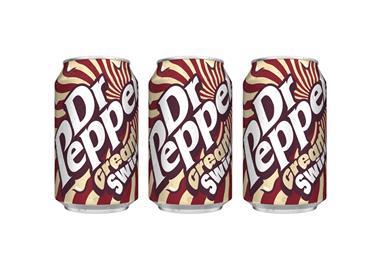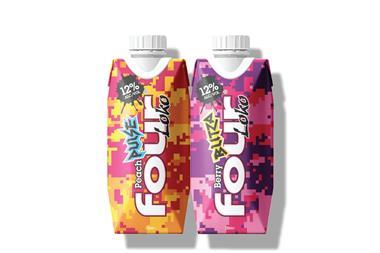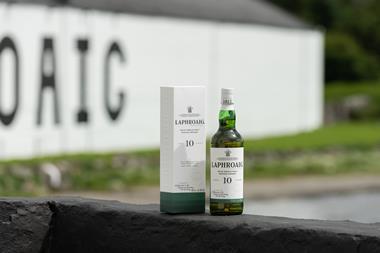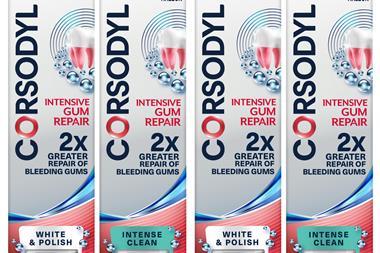Big brands are back on top but, as The Grocer's Top Products Survey 2006 reveals, there's still room for smaller players canny enough to use today's key trends to their advantage.
Low-fat, low-sugar and low-salt products have been pushing up the brand charts, as well as premium quality and convenience, but a new ingredient for success has emerged - naturalness.
The power of this trend is witnessed in the growing awareness of food miles and provenance, the glimmering of a resurgence in scratch cooking, renewed interest in retro brands, and a yearning for traditional domestic values such as home-baking, together with an appreciation of wholesome food with added functional benefits.
The behemoths of the grocery world have generally achieved their positive results through clever NPD, listening to consumers, heeding the health lobby - and flexing considerable marketing muscle.
Coke, for example, has cemented its position as the nation's biggest food brand with a rise of 5% to £931m, following the addition of 'bloke coke' Zero, while PepsiCo has turned a serious decline for its £395m bagged snack headliner Walkers standard crisps range into a 3.7% uplift thanks to a new recipe using a healthier blend of oil.
The latter's biggest rival, Procter & Gamble's Pringles, produced even better results after a similar approach, growing 15.9%, while healthier reformulations also blunted the previous year's nosedives for Pot Noodle and Dairylea.
Other grocery megabrands showing strong growth include Gillette, now in the Procter & Gamble stable, which has swelled by 5.3% to £267m, while veteran Andrex forged ahead 10% in a saturated market with the help of added value NPD such as embossing and moisturisation.
Warburtons, Hovis, Mr Kipling and Uncle Ben's have all also demonstrated there's still plenty of stretch in even the most established portfolios.
There's definitely gold to be had on them there supermarket shelves - for clever suppliers at least. No fewer than 38 out of the 52 category or sector divisions covered in this year's survey are on the rise.
This comes in spite of increasing challenges, predominantly criticism from the media and the health lobby for causing most of the nation's ills - packaging waste, obesity, health, crime and decimation of the high street to name a few - together with the prospect of ever-more stringent restrictions on health claims and advertising.
For some categories, the growth has been marginal, such as the 1.6% in butter and margarine - still a positive sign in a solidly established market dominated by a handful of stable players.
But in others - a rise of 19.2% in juices and smoothies, for example - it's been a whacking great leap. Traditional, mature markets, such as bread, which jumped 9.7%, and young pretenders, including yoghurt drinks - up 4.4% - fall some way in-between.
The fastest-growing product, however, was Goodfella's Solos pizzas, leading the charge at 3,936%. The brand started from a small base, admittedly, but consumers want high-quality products they can access easily, and its convenience and premium positioning helped it to achieve fifth place among frozen pizza brands in an otherwise ailing sector.
Meanwhile, Duchy Originals has combined soup's general health and wellbeing associations with its own organic and premium quality positioning to achieve another pretty spectacular growth figure of 155.8%.
The health lobby can pat itself on the back that consumers are heeding advice to eat - or at least to shop - more sensibly, because healthier sectors are generally ahead on growth.
Innocent Smoothies more than doubled its sales to £80m, for example, while oat-based cereals, bread with wholegrains, functional yoghurts and bottled water are also flying off the shelves.
Even within the categories showing less spectacular growth, healthier brands are in the driving seat. Ryvita and Kellogg's Nutri-Grain are the star biscuit performers with growth in double figures, while the market as a whole managed only 0.3%.
Some healthier arenas are outstripped by more traditional ones, but these share one important characteristic - they are perceived as more natural, and this is where this emerging trend is clearest.
Cake, for example, which, because of its home-baking appeal, has always been perceived as more wholesome than biscuits or confectionery - is up 2.5%, while leading brand Cadbury's Mini Rolls beats the market as a whole with a 3.1% uplift.
And while plant bread brand's growth is due in part to rising prices, there is no doubting that both Warburtons and Hovis have benefited from their nostalgic, family-based images. Even in household products there have been massive increases for Procter & Gamble's Fairy brand in fabric conditioners and dishwashing tablets, thanks to its clear 'mildness' positioning.
Consumers have tended to reject ostensibly 'diet' lines. Müllerlight has dropped 17.4%, for example, while Walkers' Light crisps and Shape yoghurt have both fallen by more than 15% this year. Even mighty WeightWatchers has slipped in frozen cheesecakes, bread, ready meals and soups (although it has countered this somewhat with strong growth in other desserts and chocolate eclairs). When it comes to food, consumers have a tendency to translate diet-oriented as 'lacks taste'.
In personal care, consumers are favouring increasingly premium shaving and oral care lines, while in body and health care, women especially are turning to brands, such as Dove and Herbal Essences, which are positioned as gentle, moisturising, or natural.
Naturalness, though, is less of a driver in household cleaning and laundry (with the exception of the Fairy brand), where convenience takes precedence, while in paper products, consumers are turning towards premium lines. That's also the story in the non-human food territory ruled by the likes of Felix and Whiskas pouches.
Low-fat, low-sugar and low-salt products have been pushing up the brand charts, as well as premium quality and convenience, but a new ingredient for success has emerged - naturalness.
The power of this trend is witnessed in the growing awareness of food miles and provenance, the glimmering of a resurgence in scratch cooking, renewed interest in retro brands, and a yearning for traditional domestic values such as home-baking, together with an appreciation of wholesome food with added functional benefits.
The behemoths of the grocery world have generally achieved their positive results through clever NPD, listening to consumers, heeding the health lobby - and flexing considerable marketing muscle.
Coke, for example, has cemented its position as the nation's biggest food brand with a rise of 5% to £931m, following the addition of 'bloke coke' Zero, while PepsiCo has turned a serious decline for its £395m bagged snack headliner Walkers standard crisps range into a 3.7% uplift thanks to a new recipe using a healthier blend of oil.
The latter's biggest rival, Procter & Gamble's Pringles, produced even better results after a similar approach, growing 15.9%, while healthier reformulations also blunted the previous year's nosedives for Pot Noodle and Dairylea.
Other grocery megabrands showing strong growth include Gillette, now in the Procter & Gamble stable, which has swelled by 5.3% to £267m, while veteran Andrex forged ahead 10% in a saturated market with the help of added value NPD such as embossing and moisturisation.
Warburtons, Hovis, Mr Kipling and Uncle Ben's have all also demonstrated there's still plenty of stretch in even the most established portfolios.
There's definitely gold to be had on them there supermarket shelves - for clever suppliers at least. No fewer than 38 out of the 52 category or sector divisions covered in this year's survey are on the rise.
This comes in spite of increasing challenges, predominantly criticism from the media and the health lobby for causing most of the nation's ills - packaging waste, obesity, health, crime and decimation of the high street to name a few - together with the prospect of ever-more stringent restrictions on health claims and advertising.
For some categories, the growth has been marginal, such as the 1.6% in butter and margarine - still a positive sign in a solidly established market dominated by a handful of stable players.
But in others - a rise of 19.2% in juices and smoothies, for example - it's been a whacking great leap. Traditional, mature markets, such as bread, which jumped 9.7%, and young pretenders, including yoghurt drinks - up 4.4% - fall some way in-between.
The fastest-growing product, however, was Goodfella's Solos pizzas, leading the charge at 3,936%. The brand started from a small base, admittedly, but consumers want high-quality products they can access easily, and its convenience and premium positioning helped it to achieve fifth place among frozen pizza brands in an otherwise ailing sector.
Meanwhile, Duchy Originals has combined soup's general health and wellbeing associations with its own organic and premium quality positioning to achieve another pretty spectacular growth figure of 155.8%.
The health lobby can pat itself on the back that consumers are heeding advice to eat - or at least to shop - more sensibly, because healthier sectors are generally ahead on growth.
Innocent Smoothies more than doubled its sales to £80m, for example, while oat-based cereals, bread with wholegrains, functional yoghurts and bottled water are also flying off the shelves.
Even within the categories showing less spectacular growth, healthier brands are in the driving seat. Ryvita and Kellogg's Nutri-Grain are the star biscuit performers with growth in double figures, while the market as a whole managed only 0.3%.
Some healthier arenas are outstripped by more traditional ones, but these share one important characteristic - they are perceived as more natural, and this is where this emerging trend is clearest.
Cake, for example, which, because of its home-baking appeal, has always been perceived as more wholesome than biscuits or confectionery - is up 2.5%, while leading brand Cadbury's Mini Rolls beats the market as a whole with a 3.1% uplift.
And while plant bread brand's growth is due in part to rising prices, there is no doubting that both Warburtons and Hovis have benefited from their nostalgic, family-based images. Even in household products there have been massive increases for Procter & Gamble's Fairy brand in fabric conditioners and dishwashing tablets, thanks to its clear 'mildness' positioning.
Consumers have tended to reject ostensibly 'diet' lines. Müllerlight has dropped 17.4%, for example, while Walkers' Light crisps and Shape yoghurt have both fallen by more than 15% this year. Even mighty WeightWatchers has slipped in frozen cheesecakes, bread, ready meals and soups (although it has countered this somewhat with strong growth in other desserts and chocolate eclairs). When it comes to food, consumers have a tendency to translate diet-oriented as 'lacks taste'.
In personal care, consumers are favouring increasingly premium shaving and oral care lines, while in body and health care, women especially are turning to brands, such as Dove and Herbal Essences, which are positioned as gentle, moisturising, or natural.
Naturalness, though, is less of a driver in household cleaning and laundry (with the exception of the Fairy brand), where convenience takes precedence, while in paper products, consumers are turning towards premium lines. That's also the story in the non-human food territory ruled by the likes of Felix and Whiskas pouches.















No comments yet